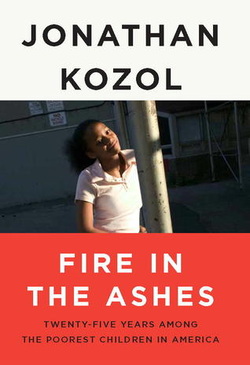
It takes all the way to the Epilogue to hear Kozol’s message that he has been honing through 25 years of interviews with children of urban poverty: “Charity and chance and narrow selectivity are not the way to educate the children of a genuine democracy.” I agree.
Unfortunately, this comes after of book of revisiting many children he has introduced to us over the past several decades, some with sad and fully expected derailments and others like “Pineapple” and “Jeremy” who have achieved academic breakthroughs despite coming from “neighborhoods of widespread destitution” principally because of charity and chance. By not giving his readers this message frame, this book, as his others, can reinforce a very different and debilitating message.
Jonathan Kozol has been called America’s premier chronicler of life among children of societal neglect. Though we tend to forgive Kozol’s aren’t-I-empathetic style and his I-have-a-relationship-with-these-poor-kids tone, I do believe that his style and tone have contributed to a response to his stories that is at conflict with his central hope: these kids deserve better. (Notice how many failed Colleges of Education he has been invited to address/commiserate with or in how many “post-modern,” navel-gazing Education courses his books are assigned reading).
In fact, I have seen/heard too many use Kozol as a justification that because of their circumstances, we can’t expect as much from these kids. “Developmentally Appropriate” is the guise of denying stimulation/expectation because these kids are so unfortunate. This is in the face of research that shows that these kids are more than capable of succeeding academically without do-gooder props or preference. There is a stronger relationship to their success with our (especially teachers’) expectations than with the children of poverty’s capabilities.
It doesn’t have to be the minority of Kozol’s-kids who succeed. And here is where Kozol is pitch perfect: we should not “celebrate exceptionality of opportunity,” but rather we can achieve transformative outcomes, irrespective of ethnic or economic background, for all children if we “give to every child the feast of learning that is now available to children of the poor only on the basis of careful selectivity or by catching the attention of empathetic people like the pastor of a church or another grown-up who they meet by chance.”
Unfortunately, this comes after of book of revisiting many children he has introduced to us over the past several decades, some with sad and fully expected derailments and others like “Pineapple” and “Jeremy” who have achieved academic breakthroughs despite coming from “neighborhoods of widespread destitution” principally because of charity and chance. By not giving his readers this message frame, this book, as his others, can reinforce a very different and debilitating message.
Jonathan Kozol has been called America’s premier chronicler of life among children of societal neglect. Though we tend to forgive Kozol’s aren’t-I-empathetic style and his I-have-a-relationship-with-these-poor-kids tone, I do believe that his style and tone have contributed to a response to his stories that is at conflict with his central hope: these kids deserve better. (Notice how many failed Colleges of Education he has been invited to address/commiserate with or in how many “post-modern,” navel-gazing Education courses his books are assigned reading).
In fact, I have seen/heard too many use Kozol as a justification that because of their circumstances, we can’t expect as much from these kids. “Developmentally Appropriate” is the guise of denying stimulation/expectation because these kids are so unfortunate. This is in the face of research that shows that these kids are more than capable of succeeding academically without do-gooder props or preference. There is a stronger relationship to their success with our (especially teachers’) expectations than with the children of poverty’s capabilities.
It doesn’t have to be the minority of Kozol’s-kids who succeed. And here is where Kozol is pitch perfect: we should not “celebrate exceptionality of opportunity,” but rather we can achieve transformative outcomes, irrespective of ethnic or economic background, for all children if we “give to every child the feast of learning that is now available to children of the poor only on the basis of careful selectivity or by catching the attention of empathetic people like the pastor of a church or another grown-up who they meet by chance.”
To be tweeted links to my new posts -- blog, book reviews (both nonfiction and fiction), data or other recommended tools -- either go to Twitter.com and follow me @jcrubicon, or just go to my Home page and click on the Twitter button on the right, just above the tweet stream, and follow me @jcrubicon.
 RSS Feed
RSS Feed
